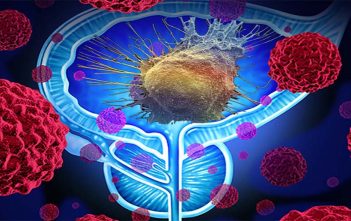Mutated RB1 Gene found in Prostrate Cancer Patients Linked to Triple Risk Factor of Fatality
Source: Institute of Cancer Research, UK May 07, 2019 5 years, 10 months, 3 weeks, 4 days, 17 hours, 56 minutes ago
Scientists have identified a gene mutation in the tumours of men with prostate cancer that is linked to very poor survival—and which could be used to pick out patients for more intensive treatment.

Men with mutations in the retinoblastoma gene in their tumours were more than three times as likely to die and nearly seven times as likely to relapse on standard treatments as those without the gene.
The retinoblastoma gene, known as RB1, is so called because mutations in it cause a rare children's eye cancer of the same name and is known to play a central role in stopping healthy cells from dividing uncontrollably.
Researchers at The Institute of Cancer Research, London, and The Royal Marsden NHS Foundation Trust believe testing men for the mutation could identify those with especially aggressive disease who need the most intensive available treatments. They are also studying new ways to treat patients with the high-risk gene.
The researchers, along with colleagues in the US and Europe, looked in detail at the DNA sequence, the activity of genes and how the tumours looked under the microscope in 444 tumours samples from 429 men with advanced prostate cancer.
Their study is published today (Monday) in the
Proceedings of the National Academy of Sciences (
PNAS), and was funded by the Prostate Cancer Foundation and Stand Up to Cancer.
The team wanted to identify which of the many genes linked to prostate cancer were the most important indicators of patient survival and response to the standard treatments abiraterone and enzalutamide.
Patients with mutations in the RB1 gene in their tumours were 3.3 times more likely to die and 6.6 times more likely to relapse during the course of the study than other men who also had standard treatment but did not have the mutation.
RB1 was the only gene found to have such an impact on survival, but mutations in two further genes—p53 and the androgen receptor gene—were associated with an increased risk of relapse on abiraterone or enzalutamide.
Mutations in DNA repair genes BRCA1, BRCA2 and ATM, and in PI3K genes were relatively common but had no impact on treatment with abiraterone or enzalutamide or on overall survival.
However, the research did identify clues for how some patients with prostate cancer could be treated more effectively using immunotherapy and a breast cancer treatment.
Men whose tumours had mutations in a gene linked to a good response to immunotherapy, CDK12, often also had mutations in the genes CDK4 and CCND1, which are the targets of a breast cancer drug called palbociclib.
That suggests that combining immunotherapy with palbociclib could be an effective treatment for this group of men.
Professor Johann de Bono, Regius Professor of Cancer Research at The Institute of Cancer Research, London, and Consultant Medical Oncologist at The Royal Marsden NHS Foundation trust, said:
"Our study really got under the bonnet of prostate cancer to understand the 'engine' drivingtumour growth and explore how a wide range of genes affect the disease and its response to treatment. We identified one particular genetic mutation that seems to indicate that tumours are going to be very aggressive, and that the affected men need the most intensive treatment we hav
e available.
"Our research could also open up various new approaches to prostrate cancer treatment, and offers the intriguing suggestion that some patients could benefit from immunotherapy alongside an existing breast cancer drug. That's a great example of how genetic research can find the common links between cancers, and ensure research into one cancer type can also benefit patients with other tumours."
Professor Paul Workman, Chief Executive of The Institute of Cancer Research, London, said:
"There are a large number of genetic mutations present in a tumour, and working out their relative importance is crucial to deliver the best precision medicine to cancer patients.
"This exciting study has identified which features of advanced prostrate tumours are the most important for treatment and survival—and has picked out one gene mutation in particular which has an especially serious adverse impact on how long patients live.
"The crucial thing now is that we make use of this information, by developing a test to identify affected men and to make sure they receive the best treatments we have available today, while also focusing our efforts on improving options for the future."
Reference: Wassim Abida el al., "Genomic correlates of clinical outcome in advanced prostate cancer," PNAS (2019). www.pnas.org/cgi/doi/10.1073/pnas.1902651116
